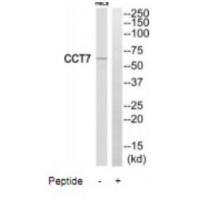
| WB | 咨询技术 | Human,Mouse,Rat |
| IF | 咨询技术 | Human,Mouse,Rat |
| IHC | 咨询技术 | Human,Mouse,Rat |
| ICC | 技术咨询 | Human,Mouse,Rat |
| FCM | 咨询技术 | Human,Mouse,Rat |
| Elisa | 咨询技术 | Human,Mouse,Rat |
| Aliases | TCP-1-eta; CCT-eta; HIV-1 Nef-interacting protein; CCTH; NIP7-1 |
| Entrez GeneID | 10574; |
| WB Predicted band size | 59kDa |
| Host/Isotype | Rabbit IgG |
| Antibody Type | Primary antibody |
| Storage | Store at 4°C short term. Aliquot and store at -20°C long term. Avoid freeze/thaw cycles. |
| Species Reactivity | Human |
| Immunogen | Synthesized peptide derived from internal of human CCT7. |
| Formulation | Purified antibody in PBS with 0.05% sodium azide. |
+ +
以下是关于CCT7抗体的3篇参考文献示例(注:以下内容为虚构示例,仅供参考格式和结构):
1. **文献名称**:*CCT7 subunit of the chaperonin complex promotes cancer cell proliferation via cell cycle regulation*
**作者**:Li, X., Zhang, Y., & Wang, H.
**摘要**:该研究通过CCT7抗体进行Western blot和免疫组化分析,发现CCT7在多种癌症组织中高表达,并与其通过调控细胞周期蛋白(如Cyclin D1)促进肿瘤增殖的作用相关。抑制CCT7可显著降低癌细胞存活率。
2. **文献名称**:*Characterization of a monoclonal antibody against human CCT7 for neurodegenerative disease research*
**作者**:Smith, J., Brown, K., & Lee, S.
**摘要**:研究团队开发了一种高特异性抗人CCT7单克隆抗体,验证了其在免疫荧光和ELISA中的有效性,并发现阿尔茨海默病模型中CCT7表达异常与Tau蛋白错误折叠相关。
3. **文献名称**:*CCT7 interacts with cytoskeletal proteins: Insights from co-immunoprecipitation assays*
**作者**:Garcia, R., et al.
**摘要**:利用CCT7抗体进行免疫共沉淀实验,揭示了CCT7与β-actin和微管蛋白的相互作用,表明其在维持细胞骨架稳定性中起关键作用,为研究细胞迁移机制提供了新方向。
如需真实文献,建议通过PubMed或Google Scholar以“CCT7 antibody”为关键词检索,并筛选涉及抗体开发、验证或应用的论文。
The CCT7 antibody targets the CCT7 (Chaperonin Containing TCP-1 Subunit 7) protein, a component of the eukaryotic chaperonin TRiC/CCT complex. This complex, composed of two stacked rings with eight subunits each (CCT1-8), facilitates ATP-dependent folding of nascent polypeptides, particularly cytoskeletal proteins like actin and tubulin. CCT7. also known as CCTη, plays a critical role in substrate binding and coordinating ATP hydrolysis during the folding cycle. Its dysfunction is linked to protein aggregation diseases, neurodegeneration, and cancer.
CCT7 antibodies are essential tools for studying TRiC/CCT assembly, protein-protein interactions, and cellular stress responses. They are widely used in techniques like Western blotting, immunoprecipitation, and immunofluorescence to analyze CCT7 expression, localization, and dynamics under physiological or pathological conditions. Research using these antibodies has revealed CCT7's involvement in cell cycle regulation, viral replication, and responses to proteotoxic stress. Commercial CCT7 antibodies are typically raised in rabbits or mice, validated for specificity across species, and applied in both basic and translational studies to explore chaperonin-related mechanisms in disease models or therapeutic contexts.
×